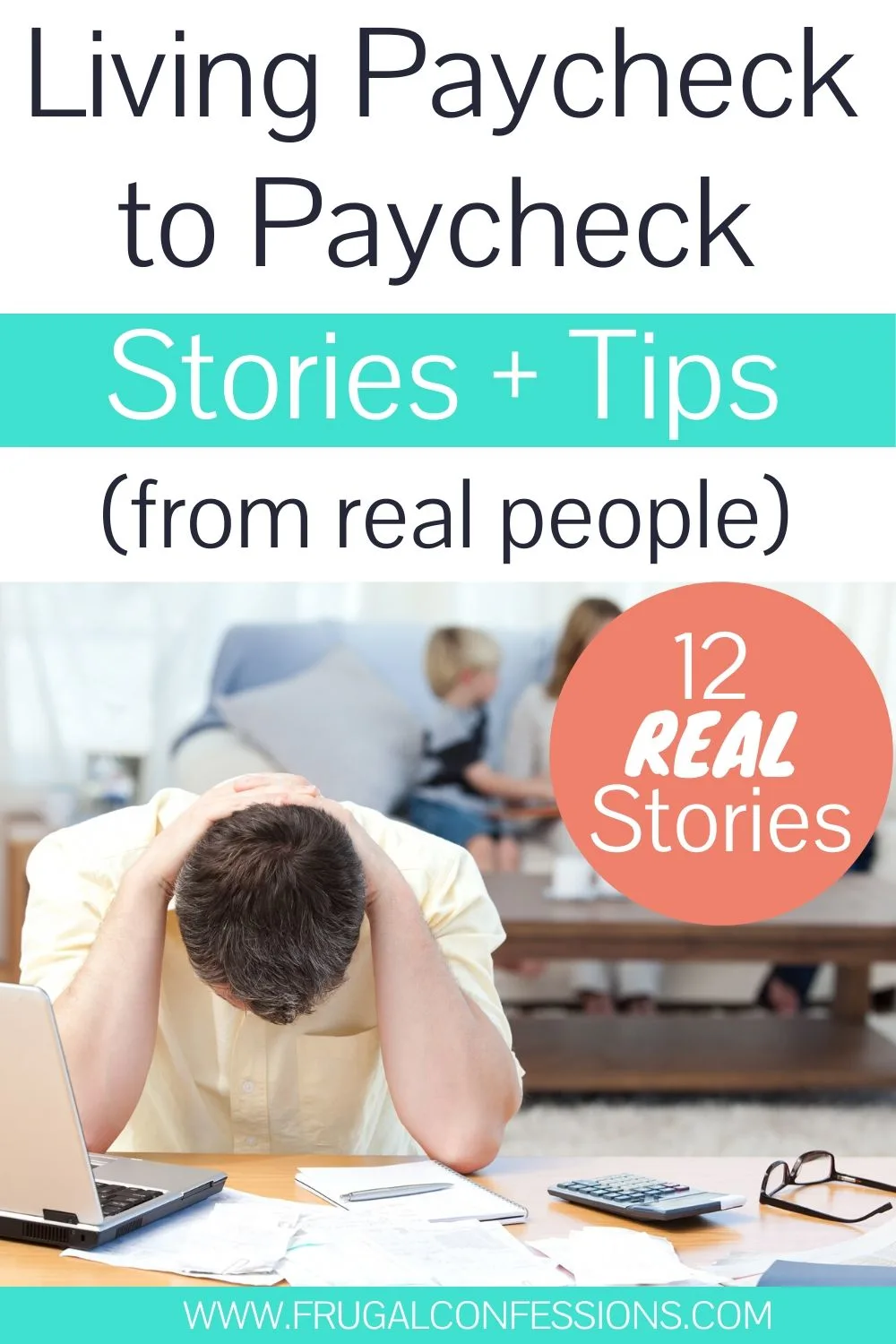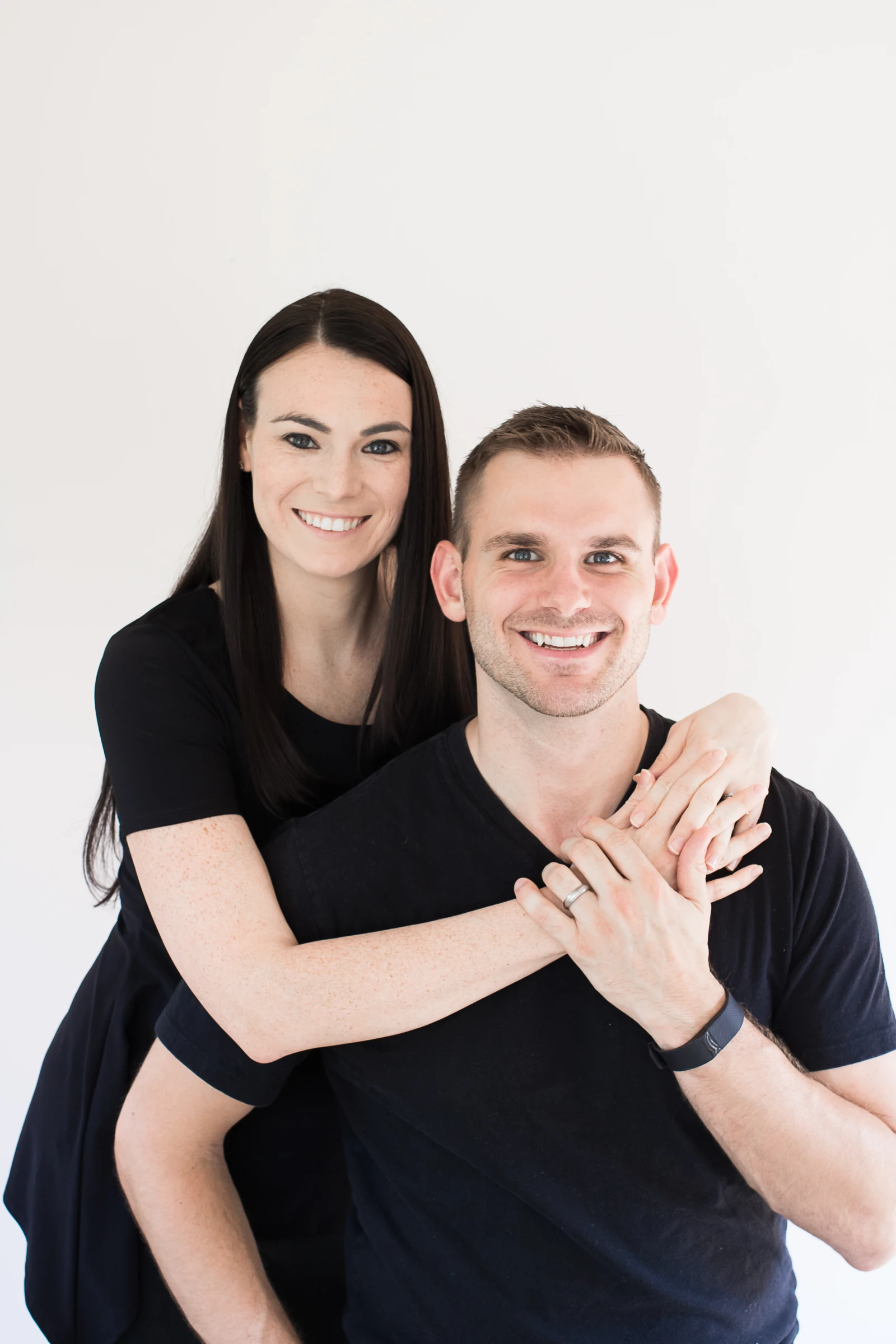I interviewed 12 people to gather their living paycheck-to-paycheck stories and share them with others. Learn tips and get inspired if you’re in their situation.
Living paycheck to paycheck pretty much sucks. Amiright?
That’s not to say that some good can’t come out of the experience – as you’ll soon see with some of these living paycheck-to-paycheck stories I’ve collected from others.

When you’re in the trenches, barely making ends meet, and tired of not having anything leftover to spend on your wants (heck, maybe even scrimping on your needs, as well), then you can turn to these inspiring stories from others who are right there with you.
Some are no longer living paycheck to paycheck, and they offer up tips for how you can get out of the cycle yourself.
Others are still there but can provide clues and tips for stretching money that you might not have thought of yet.
Whether you’re looking for comfort, tips, or for some light at the end of the tunnel, just keep reading.
You’re not alone.
What Does Living Paycheck to Paycheck Mean?
There’s the dictionary definition of living paycheck to paycheck…and then there are real definitions from people in the trenches, living this type of life day in and day out (er, rather, bill-in, and money-out).
So, what’s considered living paycheck to paycheck?
There seem to be 4 components to living this type of lifestyle, and almost all 12 of the people I interviewed included these in their own words:
- No money left for savings
- No money to pay down your debts beyond minimum payments
- Hardly enough money to cover your needs (sometimes juggling which bills to pay and which to default on)
- No extra money for things you want to buy
For example, Dawn from Stepping Stones to FI defines living paycheck to paycheck as:

“Being completely dependent on that next paycheck. It's that feeling of absolute dread that if I were to lose that paycheck, I wouldn't have grocery or gas money. It's one emergency away from going into debt. It is stressful and creates a constant baseline of anxiety and insecurity.”
And because you can’t save money, the cycle self-perpetuates with no end in sight.
Simple Money Mom, Marissa, writes, “You depend on all your money just to get by until the next paycheck comes and the cycle begins again.”
Not only that, but any unexpected expenses usually increases a person’s debt load (also increasing their monthly debt minimum payments) when they’re already living for the next payday as it is.
Sara Conklin from Frozen Pennies says, “To me, living paycheck to paycheck means having zero buffer. All money that comes in, goes out. There is no savings and any unexpected expense puts you in the negative or increases debt.”
“Often, someone living paycheck to paycheck runs out of money before the end of the month and they're left to either do without or go into debt.” – Steffa Mantilla, Money Tamer
So, what are the consequences of being stuck in this financial cycle, where debts increase, savings are stagnant, and your paycheck just cannot cover everything?
Consequences of Living Paycheck to Paycheck
So, what are the consequences of living paycheck to paycheck? What does this type of living do to your overall finances, and your quality of life, and how does it affect your future?
A quick rundown of common consequences:
- Less quality family time
- Living with fear
- Having to borrow money from family
- Feeling embarrassed
- Feeling like this is permanent
- Scheduling life around your next payday
- Having to decide on whether or not to accept assistance
- Constantly juggling money
- Paying extra fees
- Getting caught in legal troubles
- Being stuck somewhere you hate
- Having to live outside of your principles
That was the quick n’ dirty list. Now, let’s dive into actual stories from real people who are dealing with or have dealt with these consequences of living paycheck to paycheck.
1. Less Quality Family Time
Not only is there less quality family time if someone has to work extra hours or a second job to bring in more income, but the quality of that time can go down considerably when there’s such heavy financial stressors weighing on your mind.
2. Living with Fear
There are so many different fears people share with me.
- Too afraid to look at their bank account
- Fearing something major happening (like a car breaking down) that they can’t afford
- Fearing becoming sick and not being able to afford health bills
- Financial stress
Sara Conklin shares another specific fear. “One of my biggest fears was that my husband was going to find out how terribly I was managing our money. He entrusted me to take care of our family finances and I felt I was failing miserably.”
3. Having to Borrow Money from Family
Borrowing money from friends and family is no fun. It can be awkward for everyone.
Dawn said she “was also reliant upon the help of my parents and it was a constant concern that I was a burden. That I was asking too much.”
Brittany Berry, “We actually were in a car accident once. We were sitting in traffic on the interstate and someone hit us going about 50 miles an hour. We didn't have our newborn with us that day, thank goodness, and our car seemed to still run fine. Soon after that, we let someone drive it and they hit a curb. The expense was so high, we didn't have the money for it, and we couldn't “prove” that person did it. Thankfully, my mom was willing to help us.”
Lee Silsby had to borrow money from his sister.

“For 2 months I overlooked a Council tax bill. If you live in the UK you will realise that this is extremely bad. It’s not like a utility bill where they might cut your supply this is a case of if you don't pay it you could end up in front of a judge and have to go to prison. I borrowed the money off my sister to pay the 2 months and get back on track. That was a sharp lesson that helped shock me into asking for help.”
4. Feeling Embarrassed
Marissa Sanders was house-poor. She says, “I feared I would lose my home, and I felt embarrassed that I was making 50k per year and still found myself broke and living paycheck to paycheck. I was afraid to tell my husband or family that I needed help. That I made a mistake.”
5. Feeling Like this is Permanent
If you find yourself desperate for each of your paydays, unable to buy what you want, and having to juggle day-to-day just to make it, then you might feel like Marissa Sanders who feared that this was her new normal.
6. Scheduling Around Your Next Paycheck
Marissa Sanders,
“I remember quite clearly when I had to wait 4 days until my next paycheck. I had no groceries and wondered how I was going to feed my family. Two of those days, we visited family and were glad they let us stay for dinner. The other two days, we survived on ramen, mac n cheese, and eggs for dinner. I'm sure we skipped a few meals too.”
7. Deciding on Whether or Not to Take Assistance
“I can't save money” was a common theme in responses to my interviews.
Marissa Sanders sheds light on some of the guilt and struggle in deciding whether or not to accept assistance.
“I struggled mentally with the option of utilizing a food bank. I felt I didn't deserve it. It was my fault for not managing my money properly and there were others who needed it more. How could I, in good conscience, accept free food when I make $50k per year while others make much less than I?”
8. Constantly Juggling Money
Clarissa Wilson talks about the reality of juggling money.
“As long as everything was paid within a few days of the due date and before the date late fees were applied, I was in a ‘good situation’. There were also times where I would rotate not paying a creditor one month. I wouldn't pay one, but I'd pay the others. Then the next month, I paid the one that I skipped and skip another one.”

9. Paying Extra Fees
Sara Conklin shares the reality of having to pay extra fees – at a time when you really can’t afford it – because of missed deadlines, due dates, and other situations.
“There was no strategy. No budget. When they threatened to turn it off, I scrambled to come up with the money to keep it on. There were many months and many overdraft charges. There were many times I was writing a check because I knew I had at least 3 days to come up with the money. And if it bounced, it bounced. I would handle it later. At least I had groceries.”
And Ozella writes about paying excessive late fees from missing credit card payments.
“During those times when we were living paycheck to paycheck is when we really started our bad habit of using credits cards. We were using them as our backup and that seemed to start what felt like a never-ending cycle with credit card spending. Of course, we couldn't pay them off in full every month, and some months we missed the minimum payment and racked up late fees.”

10. Getting Caught in Legal Troubles
Sara Conklin was actually served papers from their heating oil company, who took them to court for not paying her bills.
Brittany Berry shares trying to dodge trouble. “We had soooo many bills go to collections. It seemed like every day we would get numerous calls from somebody threatening us. We ended up changing our phone numbers to get away from it for a while. But then the mail threats started.”
Psst: you might want to read my tips and strategies on how to deal with debt collectors.
11. Being Stuck Somewhere You Hate
Many people don’t talk about this particular consequence of the lifestyle – being stuck doing something that you hate. If you’re barely making ends meet and have no savings to even think about moving (which is expensive) or even take a month-long without pay by switching jobs and waiting for that first paycheck?
Then you might be stuck.
Kelan found himself this way, “I was completely stuck working as a jail deputy and I hated it. It put me in a deep depression and I had trouble seeing the light at the end of the tunnel. I would beat myself up for buying a house so young.”
Brittany Berry shares, “…my hubby stayed home with our son while I worked a job that paid $15.90/hour. I HATED that job. Kenny (hubby) got tired of sitting at home, so we traded places.”
12. Having to Live Outside of Your Principles
Steffa Mantilla sheds light on a different consequence – having to make decisions and live a life that’s not aligned with your values or principles.
“The biggest financial issue we faced was when we wanted to have a child. I wanted to be a stay-at-home mom but we couldn't afford that with our lifestyle. It was a reality check that something drastic needed to change or I'd have to continue going to my 9-5 job and leave my baby in daycare.”
Given how undesirable living on the financial edge is…what are the reasons why people are stuck in this cycle? Turns out, there are many reasons for this.
Why So Many Live Paycheck to Paycheck
There are tons of different reasons why so many people live paycheck to paycheck.
Some are more common than others, such as if one person in a household loses a job, or not earning enough money
Others are a bit more unique.
Reason #1: Moving and Living in a High Cost of Living Area
Take Brittany Berry’s family for example. Between 2015 and 2018, she found herself being completely dependent on each of her paydays (though still barely able to make ends meet) due to several reasons that further complicated her finances:
“We lived in a high-priced city (Louisville, KY), made $12/hour with high rent and a newborn baby.”
Moving to a high-cost-of-living city is a very common reason for living this lifestyle. Sabrina, 24, explains how she got into this same situation:

“I moved from Belgium to Toronto in 2018 just after getting my university degree. I left my family and decided to start a life in Toronto. I quickly found a job but it was an entry level salary and I was living on my own for the first time in my life. That led to a lot of overspending, almost half of my salary went to my rent, I didn't know how to budget etc.”
Reason #2: Overspending and Experiencing Lifestyle Inflation
Marissa Sanders found herself in this situation for entirely different reasons: overspending, and lifestyle inflation.
“I spent a lot of money on Amazon with my first son. I wanted the best things available. Somehow, my frugal habits went out the window when I became a mom. In addition, ALL of my bills gradually increased overtime (darn inflation) and I was too busy with my newborn son and adapting to being a mom of 2 to notice.”
Sara Conklin, with a family of five, overfinanced themselves into living this way. “We really just didn't know better. We felt like it was time to buy a house which was very inexpensive right before the housing market increased and then fell out. But then we needed a minivan with two little boys. Then we needed a camper. All of these things we got with loans.”
Psst: here are 11 more lifestyle inflation examples.
Kelan Kline, explains:

“We got into living paycheck to paycheck by over extending ourselves at the start of our marriage. I had just finished school and was bouncing around from job to job. Brittany was just starting graduate school. I finally landed a good paying job as a jail deputy for our local sheriff’s department. Before I even had my first paycheck, we went shopping to get pre-approved for a mortgage. We were somehow approved only using my letter of acceptance into the jail academy. I was the only one on the mortgage since I had minimal student loan debt. My parents helped us get enough money for the closing costs and the month after we moved into the house, we knew we made a mistake and bought a house way too quickly. We got ourselves completely stuck living paycheck to paycheck by overextending ourselves, having a single income, still going to school, and no real emergency fund.”
Steffa Mantilla, “My husband and I were earning enough money but we allowed lifestyle creep to take over. We got into the trap that because we both had good incomes, we “deserved” expensive things. Eventually, the majority of our paychecks were allocated to monthly payments for items we had already forgotten about.”
Reason #3: Tragic Situations with Big Financial Setbacks
Some people find themselves living this way quite suddenly after tragedy strikes. Dawn explains,
“I was a stay at home mom when my husband passed away unexpectedly. Our son was just 3 1/2 years old. He managed all the finances and unfortunately, I was left with nothing. I didn't have the job skills to start earning a livable wage, especially within a high cost of living area and with my need for childcare. While I had a 4-year degree, it wasn't tailored to the job market.”
Reason #4: Not Earning Enough from a Job
Working in a career field with mismatched pay and education requirements. Clarissa Wilson explains, “I was living in an area where they don't believe in paying their employees enough but require advanced college degrees. I was working full time as an accountant making $10 an hour and had 3 college degrees in accounting.”
Reason #5: Small Business Decline During the Recession
Penny writes,
“Going into 2010, my family, like many in our country, was experiencing the economic downturn directly in our household. My husband is a small business owner and business took a significant dip in 2009.
In order to keep the business afloat and not lose the 12 years of hard work he’s put into building it, we took a significant personal pay cut.
We were not well off to begin with, and we haven’t always made the smartest financial choices, but we had enough to make ends meet and sometimes overlap; I couldn’t make ends meet anymore. I have been a stay-at-home-mom since my nearly 5 year old son was born, adding a daughter to our family 2 years ago, and going back to work now would result in a net loss of income due to the exorbitant cost of child care in our area. I didn’t know what to do.”
How Do I Stop Living Paycheck to Paycheck? Their First Step.
Fortunately, many of the people I interviewed are no longer living the paycheck-to-paycheck lifestyle.
And this part fascinated me – because I knew that if THEY could get themselves out, you can do it, too.
Sometimes it’s easier to take a baby step, so I asked each of them to share their first step that they took to get out of this way of living.
Psst: definitely check out my article on stop living paycheck to paycheck tips for more ways to get yourself out of this situation.
Brittany’s First Step: Moved to Lower Cost of Living Area
Brittany Berry, “Well, the first thing we did was move from that city. We moved back to my hometown where just about everything is cheaper, except rent.”
Sabrina’s First Step: Researched How to Save and Make More Money
“I googled how to save money and make more money. I found so many helpful articles!”
Here's one: how to save money when living paycheck to paycheck.
Marissa Sander’s First Step: Getting Back to the Basics
“The first step I took was to stop all unnecessary spending. I really had to review the basics of true wants and needs. Then, I decreased all of my bills by switching companies, negotiating lower prices, asking for discounts, canceling services, and utilizing less energy, water, data, etc. For the new baby, I utilized cloth diapers, co-slept, breastfed, and wore him everywhere so that I could decrease the costs of raising a baby as much as I could. That gave me extra money to start my debt payoff strategy.”
Dawn’s First Step: Get More Education to Increase Value in the Job Market
“First, I went back to school so that I had a chance at a high-paying career upon graduation. This was 1000% worth one year of financial hardship and what ultimately allowed me to break the paycheck-to-paycheck cycle and begin to build wealth.”
Clarissa Wilson’s First Step: Get a Higher-Paying Job
“There were multiple times I set up a spreadsheet to get out of debt and apply the snowball method. But this never worked for me until I got my new job (rent was also doubled), which was double my previous salary, and was making some money in my business. With my new salary, I was able to pay everything with ease and start saving money in another account. The money was saved automatically with every paycheck. And that savings just continues to grow.”
Sara Conklin’s First Step: Catch Up on Bills with a New System
“The first step I took was to follow Dave Ramsey's advice. I started setting up a system and worked hard at catching up on bills. I remember calling the bank to see if our loan payments could be deferred a few months in order to catch everything up and set up payment plans with our electric company and heating.”
Kelan Kline’s First Step: Face the Reality by Starting a Budget
“The first thing we did was start a budget to know where our money was being spent (here are 14 simple budgeting tips for beginners). Then we removed all extra spending that was not an absolute need to stay afloat (shelter, food, transportation, utilities). Cut your expenses to the bare minimum. It does not have to be forever but this will free up money to save an emergency fund.”
Suchot Sunday’s First Step: Sell All Non-Essential Belongings
“The first step I took was to sell everything that was non-essential to me. I sold furniture. I sold kitchen appliances. I was able to easily make hundreds of dollars selling my things in a short amount of time. This might be harder for some personalities, but I don't get overly attached to most things, and I was happy to have something I could do quickly to help my situation.”
Steffa Mantilla’s First Step: Getting Informed and Start a New System
“The first step we took was reading the Total Money Makeover by Dave Ramsey and starting to follow his plan. We tallied up all our debt and used the cash envelope method to pay for everyday expenses. It really made it sink in how much money we were unnecessarily blowing.”
Lee Silsby’s First Step: Coming Clean and Getting Help from Family
“I sat down with both of my sisters who are a lot older than me and we had a chat about my finances which is a really hard thing to do but I would urge anyone who is struggling that just talking to someone close to you can make a world of difference and lift a weight off your shoulders and you can start to make plans going forward. We decided that I should go to college and get a trade. I would quit my low-paid job and then could arrange to get benefits that would pay nearly all of my rent and bills. The course would be paid for by my sisters. I eventually went on a motor mechanics course and many years later I earn a good wage as an MOT tester which means I inspect vehicles to make sure they are road safe.”
Jacqueline Gilchrist’s First Step: Having a Serious Talk with Partner
“When we came back from traveling, the first step we took was having a serious discussion about what we wanted out of life. We set long-term goals (e.g. buying a house) and short-term goals of what we needed to accomplish to make that dream happen (e.g. getting full-time jobs, securing a low-cost basement rental).”
Ozella’s First Step: Learning How to Manage Money
“Honestly, the first thing my husband and I did to start our process of escaping that paycheck-to-paycheck living was learning how to manage our money better. I didn't know it then, but we were actually budgeting. We had low income for a family of 4 at that time, but once we were able to track where our money needed to be spent, those dollars started stretching even more.”
How Can I Save Money if I Live Paycheck to Paycheck?
In this section, I want to include a rundown of really helpful tips from people I interviewed so that you can pick the ones that will most impact your life, as quickly as possible.
- “Stop caring about what others think. This is your life you don't need to keep up with the Jones.”
- “Side hustles! I increased my income. I had already reduced my expense by a lot, but there is only so far you can reduce your expenses. At some point, making extra money makes sense. This is why I'm passionate about helping women find the perfect side hustle for them (on my site The Curious Frugal), and to help people out of tough financial situations.”
- Move from a higher-cost-of-living area to a lower one.
- Get qualifications so that you can land a better-paying job.
- Carpool to work.
- Work lots of overtime, at least until you save up an emergency fund amount (here are examples of emergency fund amounts).
You'll also definitely want to check out my article with 250 money-saving tips. Bookmark it, and start to work on 1-3 things each week.
Wow – I don't know about you, but I felt emotionally invested in reading each of these people's stories, quotes, and experiences with living paycheck to paycheck. I'm SO thankful they shared this, and hope so much that you got a lot out of it, as well!
